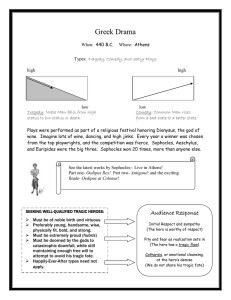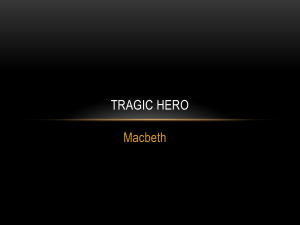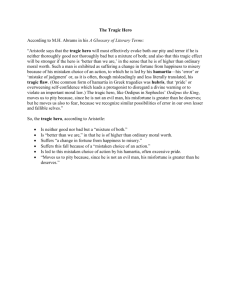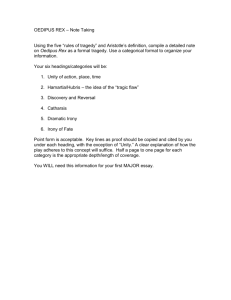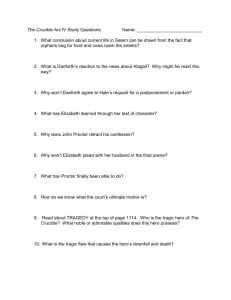PowerPoint-Greek Tragedies and Tragic Hero
advertisement
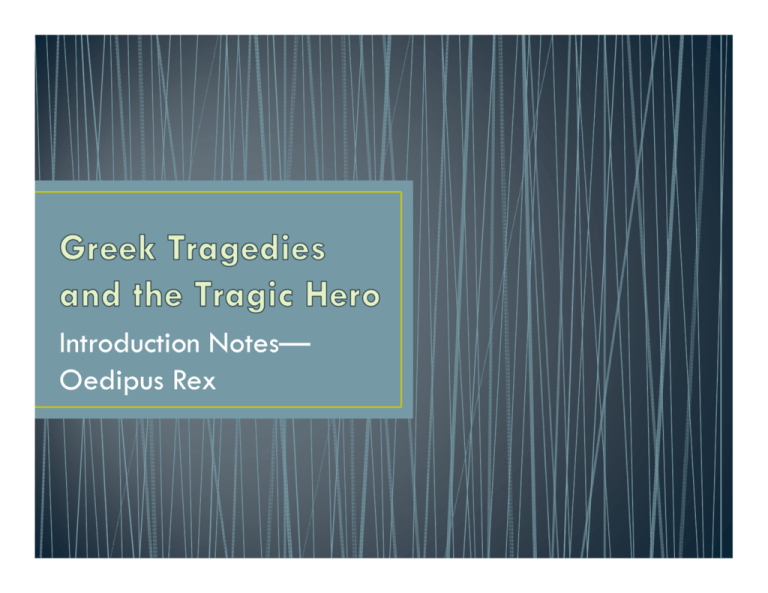
Introduction Notes— Oedipus Rex Are based on widely known myths or famous historical events, so the audience would know the characters and outline of the story they were about to see. Sophocles’ Athenian audience would already know that the story of Oedipus Rex came from the cycle of myths about the city of Thebes, one of Athens’ rivals in the 5th century. Heroes were mortals, such as Helen of Troy or Achilles, who were worshipped as demigods after their deaths. Murder and incest violate natural law as well as human law, so these crimes were seen as offensive to the gods. • The Greeks believed that, when a murder was committed, the murderer, the place of the crime, and any place that harbored the killer were polluted, that is, outside the favor of the gods. • A proper ritual cleansing (catharsis) was necessary to restore both person and place to an acceptable state. Apollo’s oracle at Delphi is the most important place of prophecy in the Greek world The Oedipus story is set in c. 420 BC, a few generations before the Trojan War, which the ancient Greeks placed in 1184 BC. Must be a character of noble stature and greatness. This should be readily evident in the play. The character must occupy a "high" status position but must ALSO embody nobility and virtue as part of his/her innate character. • Though the tragic hero is pre-eminently great, he/she is not perfect. Otherwise, the rest of us-mere mortals--would be unable to identify with the tragic hero. • We should see in him or her someone who is essentially like us, although perhaps elevated to a higher position in society. • The hero's downfall, therefore, is partially her/his own fault, the result of free choice, not of accident or villainy or some overriding, malignant fate. In fact, the tragedy is usually triggered by some error of judgment or some character flaw that contributes to the hero's lack of perfection noted above. • This error of judgment or character flaw is known as hamartia and is usually translated as "tragic flaw". Often the character's hamartia involves hubris (which is defined as a sort of arrogant pride or overconfidence). • The hero's misfortune is not wholly deserved. The punishment exceeds the crime. • The fall is not pure loss. There is some increase in awareness, some gain in selfknowledge, some discovery on the part of the tragic hero.. • Though it arouses solemn emotion, tragedy does not leave its audience in a state of depression. • It might be worth noting here that Greek drama was not considered "entertainment," pure and simple; it had a communal function--to contribute to the good health of the community. This is why dramatic performances were a part of religious festivals and community celebrations. • Aristotle argues that one function of tragedy is to arouse the "unhealthy" emotions of pity and fear and through a catharsis (which comes from watching the tragic hero's terrible fate) cleanse us of those emotions. • Demanding that the world “answer to me” instead of the other way around leads to a systematic destruction. • Living life only on your own terms is going to come to a self-destructive end. • This “Freedom of Expression” is essentially defying the gods and will punish the hero. • A message from Oedipus: “Life is mysterious and cruel. You may think you can live your life however you want, but fate is much more powerful, complex, and hostile. Fate punishes arbitrarily and mercilessly those who choose to confront the mystery of it.”
